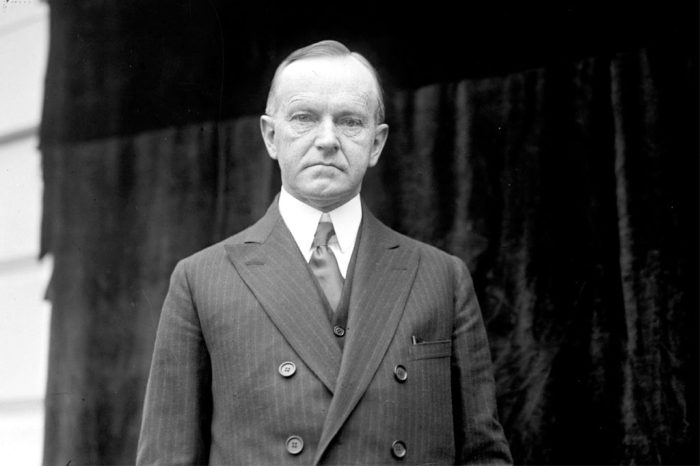Calvin coolidge most important lesson – Calvin Coolidge’s presidency, marked by the iconic “Coolidge Prosperity” and his “Silent Cal” persona, left an enduring mark on American history. This comprehensive analysis explores Coolidge’s most important lesson, examining his economic, social, foreign, and leadership policies, as well as his lasting impact on conservatism.
Coolidge’s conservative approach to governance, emphasizing limited government intervention, fiscal responsibility, and individual liberty, shaped his policies and contributed to his legacy as a proponent of American conservatism.
Historical Context

Calvin Coolidge’s presidency, from 1923 to 1929, marked a period of prosperity and economic growth in the United States. Coolidge, a Republican, ascended to the presidency following the death of Warren G. Harding and quickly established a reputation for his conservative fiscal policies and laissez-faire approach to government.
During Coolidge’s presidency, the United States experienced a period of economic expansion known as the “Roaring Twenties.” The economy boomed, and the stock market reached record highs. Coolidge’s policies, which included tax cuts and a reduction in government spending, were credited with fostering this economic growth.
Challenges and Opportunities
Despite the economic prosperity of the Roaring Twenties, Coolidge’s presidency was not without its challenges. The United States faced a number of social and political issues, including the rise of organized crime, Prohibition, and the Ku Klux Klan.
Coolidge also faced criticism for his handling of the Teapot Dome scandal, a corruption scandal involving the leasing of federal oil reserves. Despite these challenges, Coolidge remained a popular figure throughout his presidency.
Economic Policies
Calvin Coolidge’s economic policies, often referred to as “Coolidge Prosperity,” were characterized by a combination of tax cuts, deregulation, and balanced budget principles. These policies aimed to stimulate economic growth and promote a favorable business climate.
Tax Cuts
Coolidge believed that reducing taxes would encourage investment and economic activity. He signed the Revenue Act of 1924 and the Revenue Act of 1926, which lowered income tax rates and eliminated some taxes altogether. These tax cuts led to an increase in disposable income for individuals and businesses, contributing to the economic expansion of the time.
Deregulation
Coolidge also advocated for deregulation to reduce government intervention in the economy. He believed that businesses could operate more efficiently and profitably with fewer regulations. Coolidge reduced regulations in various industries, including transportation, utilities, and banking, allowing businesses to expand and innovate more freely.
Balanced Budget
Coolidge was a staunch advocate for balanced budgets, believing that the government should not spend more than it takes in. He worked to reduce government spending and eliminate budget deficits. By adhering to fiscal discipline, Coolidge aimed to stabilize the economy and maintain low inflation.
The combination of Coolidge’s economic policies helped foster a period of economic prosperity in the United States. The economy experienced significant growth, unemployment fell, and wages increased. The “Coolidge Prosperity” era became a model for conservative economic policies that emphasized tax cuts, deregulation, and fiscal responsibility.
Social Policies

Calvin Coolidge’s social policies were characterized by a conservative approach that emphasized traditional values, limited government intervention, and the preservation of the status quo. He held strong views on immigration, prohibition, and civil rights, which shaped his policies in these areas.
Immigration
Coolidge supported restrictive immigration policies, believing that uncontrolled immigration posed a threat to American culture and institutions. He favored a quota system that limited the number of immigrants from certain countries, particularly those from Eastern and Southern Europe. This approach reflected the prevailing nativist sentiment of the time, which viewed immigrants as a source of social and economic problems.
Prohibition
Coolidge was a staunch supporter of Prohibition, the constitutional ban on the sale, manufacture, and transportation of alcoholic beverages. He believed that alcohol consumption led to crime, poverty, and social disorder. Under his presidency, the government vigorously enforced Prohibition laws, resulting in widespread bootlegging and corruption.
Despite Coolidge’s support, Prohibition proved to be unpopular and was eventually repealed in 1933.
Civil Rights
Coolidge’s views on civil rights were conservative and reflected the dominant racial attitudes of his time. He opposed federal intervention in matters of race relations, believing that states should handle such issues. Coolidge’s administration did not actively promote civil rights initiatives, and he made no significant efforts to address racial discrimination or segregation.
Foreign Policy
Coolidge’s foreign policy was characterized by a strong emphasis on isolationism, a desire to minimize American involvement in foreign affairs. He believed that the United States should focus on its own domestic affairs and avoid entanglements in international conflicts.
Latin America
In Latin America, Coolidge pursued a policy of “dollar diplomacy,” using economic power to promote American interests in the region. He supported the interventions in Nicaragua and Haiti and increased American investment in Latin America.
Europe, Calvin coolidge most important lesson
In Europe, Coolidge was reluctant to become involved in the League of Nations or other international organizations. He believed that the United States should remain aloof from European affairs and focus on its own interests. He also opposed the cancellation of war debts owed by European countries to the United States.
Leadership Style

Calvin Coolidge’s leadership style was characterized by his taciturn nature, which earned him the nickname “Silent Cal.” His approach to the presidency was marked by a minimalist approach, emphasizing limited government intervention and fiscal conservatism.
Communication Style
Coolidge was known for his sparse and deliberate communication. He preferred to let his actions speak louder than his words, and he often relied on written statements and press conferences to convey his messages. His speeches were brief and to the point, and he avoided using rhetoric or emotional appeals.
Decision-Making Process
Coolidge’s decision-making process was based on careful deliberation and a pragmatic approach. He sought advice from a small circle of trusted advisors and took his time to consider all options before making a decision. He believed in the importance of consensus and often sought to build support for his policies before implementing them.
Legacy

Coolidge’s presidency left a lasting impact on American history. He is remembered as a conservative leader who restored economic prosperity and promoted limited government intervention.
Coolidge’s policies helped to reduce the national debt, balance the budget, and stimulate economic growth. He also supported tax cuts and deregulation, which further boosted the economy.
Contributions to Conservatism
Coolidge’s presidency was a turning point in the development of American conservatism. He helped to shift the Republican Party away from its progressive roots and towards a more conservative ideology.
Coolidge’s conservatism was based on the belief in limited government, free markets, and individual responsibility. He argued that the government should play a minimal role in the economy and that individuals should be free to pursue their own economic interests.
Reputation Among Historians
Historians generally rank Coolidge as a successful president. He is praised for his economic policies, his commitment to limited government, and his leadership during a period of relative peace and prosperity.
However, some historians have criticized Coolidge for his lack of attention to social issues. They argue that he did not do enough to address the problems of poverty, inequality, and racial discrimination.
FAQ Section: Calvin Coolidge Most Important Lesson
What was Coolidge’s most significant economic policy?
Coolidge’s “Coolidge Prosperity” was a period of sustained economic growth fueled by tax cuts, deregulation, and a balanced budget.
How did Coolidge approach social issues?
Coolidge held conservative views on social issues, supporting immigration restriction, prohibition, and limited government intervention in civil rights.
What was Coolidge’s foreign policy doctrine?
Coolidge pursued an isolationist foreign policy, avoiding international entanglements and focusing on Latin American relations.
How did Coolidge’s leadership style impact his presidency?
Coolidge’s “Silent Cal” persona, characterized by prudence and deliberation, influenced his decision-making and communication style.